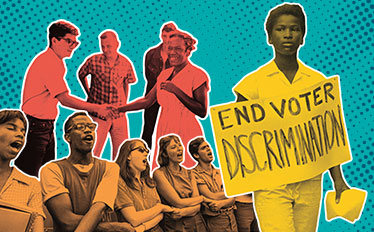Being able to vote in elections is a right Americans often take for granted. But for African Americans in the Deep South of the 1960s, even trying to register to vote could be fatal.
It had been that way for nearly 100 years. When the Civil War (1861-65) and slavery ended in 1865, white Southerners in some states found themselves outnumbered by the people they’d once enslaved. Then, in 1870, the 15th Amendment became law, guaranteeing African Americans the right to vote. Fearful of losing their grip on power, white legislators passed state and local laws to prevent Black citizens from exercising that right.
Some laws required voters to pass written tests to cast a ballot. Such tests were designed to be too hard for formerly enslaved people, who hadn’t been allowed to learn to read and write. Other laws set poll taxes that had to be paid to register to vote—and were purposely too high for poor Black people to afford. Even a century after slavery’s end, such tactics kept most Black Southerners from voting.



